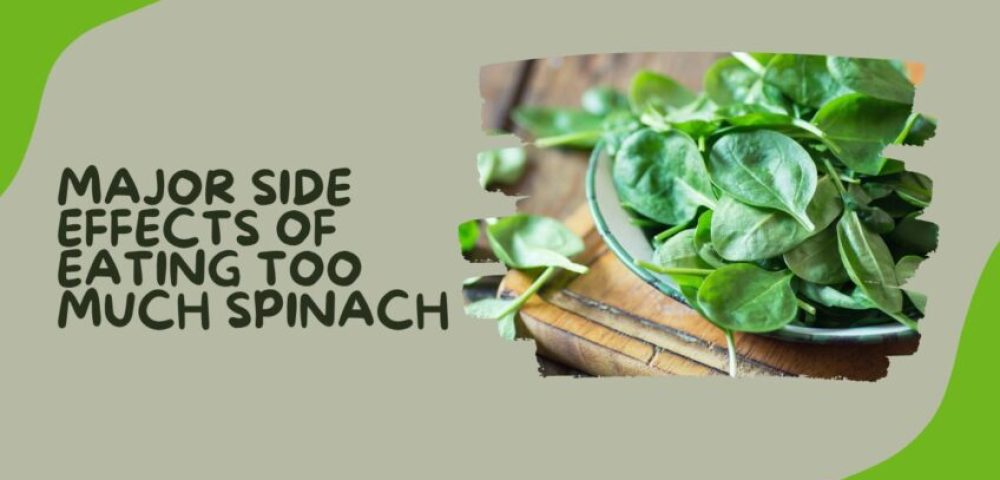Spinach has long been recognized as a nutritious food, prized for its high vitamin and mineral content. In fact, it is often considered a superfood due to its numerous health benefits. From Popeye’s famous love of spinach to its inclusion in modern-day salads and smoothies, this leafy green has become a popular staple in many diets. This article will explore the health benefits of spinach while also delving into the potential risks of consuming too much of this green vegetable.
Page Contents
- 1 Nutritional benefits of spinach
- 1.1 Vitamin K Overdose
- 1.2 Heavy Metal Toxicity
- 1.3 Interference with Medications
- 1.4 Renal Failure
- 1.5 Hypertension
- 1.6 Risks of Spinach During Pregnancy
- 1.7 Frequently Asked Questions
- 1.8 Does spinach trigger IBS?
- 1.9 Can you be intolerant to spinach?
- 1.10 Is spinach good for your bowels?
- 1.11 How much of spinach is too much?
- 1.12 Can spinach make your stomach hurt?
- 1.13 Why should we not eat spinach at night?
- 2 Conclusion
Nutritional benefits of spinach
Spinach is an excellent source of many important nutrients, including vitamin K, vitamin A, vitamin C, iron, and folate. It is also rich in antioxidants and contains fiber, which can aid in digestion and help promote satiety.
Additionally, spinach contains compounds that have been shown to have anti-inflammatory properties, potentially reducing the risk of chronic diseases such as heart disease and cancer. With all these nutritional benefits, it’s no wonder that spinach is considered a healthy food. However, as with any food, consuming too much of it can lead to potential health risks.
| Nutrient | Amount | % Daily Value |
|---|---|---|
| Calories | 7 | 0.4% |
| Protein | 0.9 g | 1.8% |
| Carbohydrates | 1.1 g | 0.4% |
| Fiber | 0.7 g | 2.8% |
| Fat | 0.1 g | 0.2% |
| Vitamin A | 56% DV | |
| Vitamin C | 14% DV | |
| Vitamin K | 181% DV | |
| Folate | 15% DV | |
| Iron | 5% DV | |
| Calcium | 3% DV | |
| Magnesium | 6% DV | |
| Potassium | 5% DV |
Vitamin K Overdose
Vitamin K is a fat-soluble vitamin that plays a crucial role in blood clotting. It is also involved in bone health and has been shown to have anti-inflammatory effects. Vitamin K deficiency can lead to bleeding disorders and osteoporosis.
While it is rare to overdose on vitamin K from food alone, consuming excessive amounts of spinach, which is high in vitamin K, can lead to vitamin K toxicity. This is especially true for individuals taking blood-thinning medications, as vitamin K can interfere with their effectiveness.
Symptoms of vitamin K overdose may include jaundice, nausea, and vomiting. Additionally, vitamin K toxicity can lead to blood clotting problems, which can be dangerous and potentially life-threatening. It is important for individuals taking blood-thinning medications to monitor their vitamin K intake and consult with their healthcare provider before making any significant changes to their diet.
Heavy Metal Toxicity
Spinach, like many leafy green vegetables, can absorb heavy metals such as lead and cadmium from the soil in which it is grown. These metals can accumulate in the body over time and lead to potential health risks.
Heavy metal toxicity can lead to a variety of health problems, including kidney damage, nerve damage, and developmental issues in children. Ingesting high levels of heavy metals over time can also increase the risk of cancer.
To reduce the risk of heavy metal toxicity, it is important to choose spinach that has been grown in soils that are free from heavy metals. This can be done by purchasing organic spinach or by researching the growing practices of the spinach producer. Additionally, washing spinach thoroughly before consuming it can help to remove any residual heavy metals.
Interference with Medications

Spinach contains compounds called oxalates, which can bind to certain medications and reduce their effectiveness. Medications that are particularly susceptible to this interference include antibiotics, blood pressure medications, and thyroid medications.
When medications are not fully effective, it can lead to a worsening of symptoms or complications. Additionally, if medications are not metabolized and eliminated from the body as intended, it can lead to potential side effects and toxicity.
As mentioned, certain medications are more susceptible to interference from spinach consumption. For example, individuals taking thyroid medications should avoid consuming large amounts of spinach, as oxalates can bind to the medication and reduce its effectiveness.
Similarly, individuals taking blood pressure medications may need to monitor their spinach intake, as it can interfere with the medication’s ability to regulate blood pressure.
Renal Failure
Spinach is high in oxalates, which can contribute to the formation of kidney stones. Over time, this can lead to chronic kidney disease and even renal failure.
Oxalates are a compound found in many foods, including spinach. When consumed in excess, oxalates can bind to calcium in the body, leading to the formation of calcium oxalate crystals. These crystals can accumulate in the kidneys and form kidney stones, which can damage the kidneys over time.
Symptoms of renal failure may include fatigue, swelling in the legs and feet, decreased urine output, and confusion. Left untreated, renal failure can be life-threatening. It is important for individuals at risk of renal failure, such as those with a history of kidney stones or chronic kidney disease, to monitor their spinach intake and speak with their healthcare provider about any concerns.
Hypertension

While spinach is generally considered a healthy food, it is also high in sodium. Consuming excessive amounts of sodium can contribute to hypertension, or high blood pressure.
Sodium and potassium are both electrolytes that play important roles in the body. While sodium can contribute to hypertension, potassium has the opposite effect, helping to lower blood pressure. Consuming a diet high in potassium and low in sodium can help to regulate blood pressure and reduce the risk of hypertension.
To balance sodium and potassium intake, it is important to consume a diet rich in fruits and vegetables, such as spinach, that are high in potassium. Additionally, reducing sodium intake by avoiding processed foods and limiting salt intake can help to regulate blood pressure.
Risks of Spinach During Pregnancy

While spinach can provide many benefits during pregnancy, there are also potential risks to be aware of. One of the main concerns is the risk of excessive vitamin K intake. Vitamin K is important for blood clotting, but excessive intake can interfere with certain medications, including blood thinners. This can be a particular concern for pregnant women who may be taking blood thinners to manage certain medical conditions.
Additionally, spinach can absorb heavy metals from the soil in which it is grown, which can be a concern for pregnant women. Exposure to heavy metals during pregnancy can increase the risk of developmental issues in the fetus.
Frequently Asked Questions
Does spinach trigger IBS?
There is no conclusive evidence that spinach triggers Irritable Bowel Syndrome (IBS) in all individuals. However, some people with IBS may experience symptoms such as bloating, gas, and abdominal pain after consuming certain high-fiber foods like spinach.
Spinach is a high-fiber vegetable that contains both soluble and insoluble fibers. Soluble fiber can be beneficial for individuals with IBS as it helps regulate bowel movements and can improve stool consistency. However, insoluble fiber can be difficult to digest and may worsen symptoms in some people with IBS.
If you have IBS and are concerned about spinach triggering your symptoms, you may want to try eliminating spinach from your diet for a period of time and see if your symptoms improve. It’s also important to work with a healthcare professional or registered dietitian to create a well-balanced diet that meets your nutritional needs while managing your IBS symptoms.
Can you be intolerant to spinach?
Yes, it is possible to be intolerant to spinach. Spinach contains various compounds such as oxalates and histamines that can trigger adverse reactions in some individuals.
Oxalates are naturally occurring substances found in many plant-based foods, including spinach. In some people, high intake of oxalates can lead to the formation of kidney stones or exacerbate existing kidney problems.
Is spinach good for your bowels?
Yes, spinach can be good for your bowels due to its high fiber content. Spinach contains both soluble and insoluble fibers that can help regulate bowel movements and improve overall gut health.
Soluble fiber dissolves in water and forms a gel-like substance in the digestive tract, which can help soften stools and promote regular bowel movements. Insoluble fiber, on the other hand, adds bulk to stools and helps move food through the digestive tract.
How much of spinach is too much?

The recommended serving size for spinach is about 1 cup of raw spinach or 1/2 cup of cooked spinach. However, the amount of spinach that is considered “too much” can vary depending on factors such as individual tolerance, underlying health conditions, and medication use.
Spinach contains high levels of oxalates, which can contribute to the formation of kidney stones in some individuals. Consuming large amounts of spinach, particularly raw spinach, can increase the risk of developing kidney stones in susceptible individuals. Additionally, spinach contains compounds called nitrates, which can convert to nitrites and potentially increase the risk of certain types of cancer if consumed in excess.
Can spinach make your stomach hurt?
Yes, spinach can potentially make your stomach hurt, particularly if you have a sensitive stomach or underlying digestive issues.
Spinach contains high levels of dietary fiber, which can be difficult to digest for some individuals. This can lead to symptoms such as bloating, gas, and abdominal discomfort, particularly if consumed in large quantities or raw.
Why should we not eat spinach at night?
There is no scientific evidence to suggest that we should not eat spinach at night. In fact, spinach can be a healthy and nutritious addition to any meal, regardless of the time of day.
Spinach is a low-calorie vegetable that is packed with vitamins, minerals, and antioxidants that are important for overall health. It is also a good source of dietary fiber, which can help regulate digestion and promote feelings of fullness.
Conclusion
While spinach is a nutritious food that offers many health benefits, it is important to monitor intake to avoid potential health risks. Excessive consumption of spinach can lead to vitamin K toxicity, heavy metal toxicity, interference with medications, renal failure, and hypertension. By understanding these risks and taking steps to mitigate them, individuals can continue to enjoy the health benefits of spinach while promoting overall health and well-being.
Theodore is a prolific author at Fischer Institute, known for his insightful articles on health and nutrition. His expertise spans a wide range of topics, from the benefits of traditional foods to the latest in health trends, always aiming to educate and empower readers towards better wellbeing.















